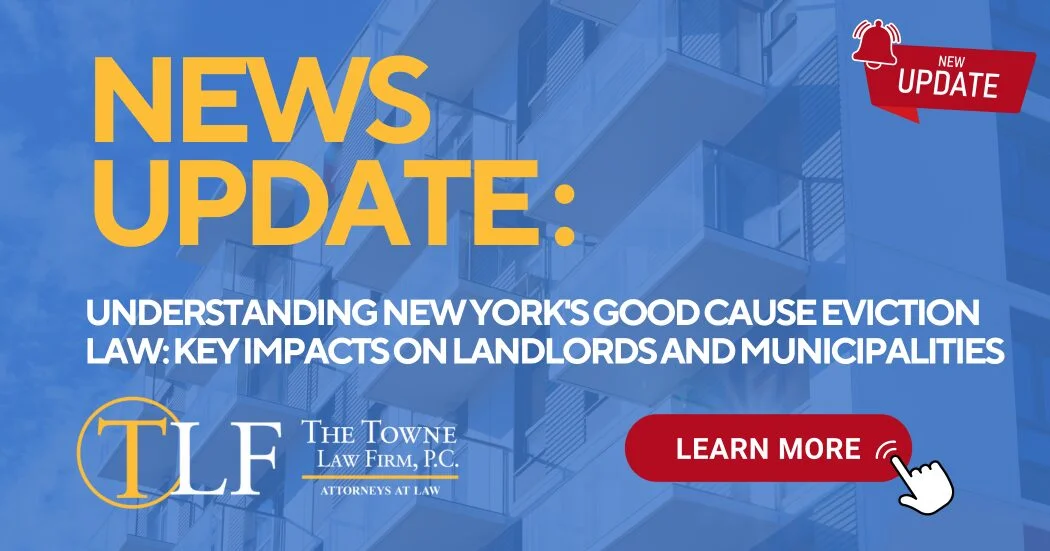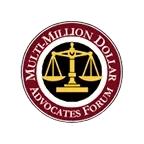Understanding New York’s Good Cause Eviction Law: Key Impacts on Landlords and Municipalities
Jun 17, 2024ALBANY, NY | In January of this year, New York State amended its real property law by adding Article 6-A, known as the “Good Cause Eviction Law” (N.Y. Real Prop. Law §§ 210-18). Following the expiration of various legislative and executive actions in 2020, which implemented temporary moratoria on evictions during the COVID-19 pandemic, New York housing courts saw a significant increase in eviction cases. The Good Cause Eviction Law (“GCE Law”) is one of the measures introduced to address this issue, aiming to regulate rent prices and define permissible grounds for eviction.
The GCE Law went into effect on April 20, 2024. Although the law is binding on landlords with covered rental properties located in New York City, it is not automatically applicable to other municipalities or local governments. Pursuant to § 213 of the law, rental properties outside of NYC are subject to the GCE Law only if the local legislative body for any village, town, or city in which the property is located adopts the provisions of the GCE Law. The City of Albany was the first municipality outside of NYC to adopt this law, Local Law E of 2024, with a majority of Albany Common Council members voting yes to adoption on June 3, 2024.¹ Although Albany is presently the only municipality to have adopted the Act, other municipalities (i.e., Kingston, NY) are considering doing the same.² Under the GCE Law, NYS Division of Housing and Community Renewal (DHCR) will be responsible for publishing a notice by August 1st of each of the towns, cities, and villages that have opted to adopt the law.
Rental Units Covered by GCE Law
Not all rental properties are subject to the GCE Law. For instance, pursuant to §§ 211(2)(a) and 214(15), rental units are not covered by the GCE Law if they have a monthly rent above the applicable Fair Market Rent threshold. Unless any local government opting into the GCE Law provides a different Fair Market Rent threshold, the GCE Law does not cover a rental unit rented for more than 245% of Fair Market Rent. Under the City of Albany’s Local Law E of 2024, however, the threshold is set at 345% of Fair Market Rent in the City of Albany. A list of Fair Market Rent values will be included in the DHCR’s annual notice.
Furthermore, premises owned by a “small landlord” are generally exempt from the provisions of the GCE Law. Under § 211(3), subject to modification by applicable local law, a “small landlord” is defined as a natural person holding direct or indirect ownership interest of no more than ten units in NYS. If a landlord is an entity, then that landlord is a small landlord if each natural person with direct or indirect ownership interest in the entity (or any affiliated entity) owns no more than ten units in NYS. It is important to note that, in the case of entities, the entity must be able to provide the names of all natural persons with a direct or indirect ownership interest in the entity to qualify as a small landlord. Under the City of Albany’s Local Law E of 2024, however, “small landlord” is defined as a landlord of no more than one unit anywhere in NYS.
Additional situations where rental units may not be covered by the GCE Law include the following:
- Owner-occupied premises with less than ten units;
- Premises sublet where the sublessor seeks in good faith to recover possession for their personal use and occupancy;
- Premises incident to employment when such employment is being lawfully terminated;
- Premises otherwise subject to regulation of rent or evictions under state or federal law;
- Buildings for which a Temporary Certificate of Occupancy or Permanent Certificate of Occupancy was issued after January 1, 2009, for a period of thirty years;
- Seasonal use units;
- Units within hospitals;
- Manufactured homes;
- Hotel rooms or other transient uses;
- Dormitories; or
- Units within religious facilities or institutions.
“Good Cause” Requirement
Under the GCE Law, landlords are prohibited from taking any action to evict, fail to renew a lease, or otherwise seek to remove a tenant from housing accommodation except for “good cause.” § 216(1) sets forth permissible grounds for removal or eviction, including the failure to pay rent, violation of a substantial obligation of the tenancy, committing or permitting a nuisance, permitting the premises to be used for illegal purposes, unreasonably refusing the landlord access to the premises for purpose of making necessary repairs or improvements or for showing the unit, the to be premises are to be personally occupied by the landlord or close relatives of the landlord as their primary residence, demolition, withdrawal of the premises from the housing rental market, or the tenants failure to agree to reasonable changes to a lease at renewal (including reasonable increases in rent).
Moreover, § 216(2) of the GCE Law creates a private right of action for tenants required to surrender housing accommodations if a landlord makes a fraudulent statement regarding a proposed use for personal or family use, removal from the rental housing market, or demolition of the housing accommodation.
Rent Increases
As mentioned above, failure to pay rent is a permissible ground for the removal of a tenant, however, the rent due and owing may not result from a rent increase considered unreasonable under the GCE Law. The GCE Law presumes that any such increase is unreasonable if made in any calendar year, after the April 20th effective date or date with which the applicable local municipality adopted the law, “by an amount greater than the local rent standard, provided further that no rent increase less than or equal to the local rent standard shall be deemed unreasonable.” (GCE Law § 216). The “local rent standard” is defined as a rent increase equal to the lesser of 10% or 5% plus the annual percentage change in the Consumer Price Index.
Factors that must be considered by the court in determining whether a rent increase is unreasonable include the landlord’s cost for fuel and other utilities, insurance, and maintenance; property tax expenses and increases thereto; and completed “significant repairs” that did not result from the landlord’s failure to properly maintain the building or housing accommodation.
“Good Cause Eviction Law Notice”
In addition to the requirements of Article 6-A, effective August 18, 2024, all landlords must comply with the Good Cause Eviction Law Notice requirement mandated by Article 7 of New York’s real property law, § 231-c. This notice mandate applies to all landlords, whether or not exempt from the GCE Law, and requires landlords append to or incorporate the proper notice into any initial lease, renewal lease, notices, and petitions for all apartments. If the unit is exempt from the GCE Law, such notice must explicitly identify the applicable exemption. A fillable template of the statutorily required notice can be found on https://newyork.public.law.³
As is the case with the GCE Law, mandates provided by the Good Cause Eviction Law Notice are applicable to rental properties in NYC, the City of Albany, and other municipalities that have opted into the law.
Written by TLF Partner, Mark Houston and Summer Associate, Anthony Leandro. Contact Us Today!
¹Local Law E of 2024 repeals Article XXIII (Prohibition of Eviction Without Good Cause) of Chapter 30 (City Court Act) and adds a new Part 6 (Prohibition of Eviction Without Good Cause) to Chapter 231 (Housing) of the Code of the City of Albany.
²Holden Walter-Warner, Albany, Kingston eye “good cause eviction” law, enabled by state, April 30, 2024 (https://therealdeal.com/new-york/tristate/2024/04/30/albany-kingston-considering-new-good-cause-eviction-law/).
³https://newyork.public.law/laws/n.y._real_property_law_section_231-c#:~:text=In%20connection%20with%20any%20eviction%20proceeding%20in%20which,units%2C%20excluding%20each%20natural%20person%20owner%E2%80%99s%20principal%20residence.
Share














